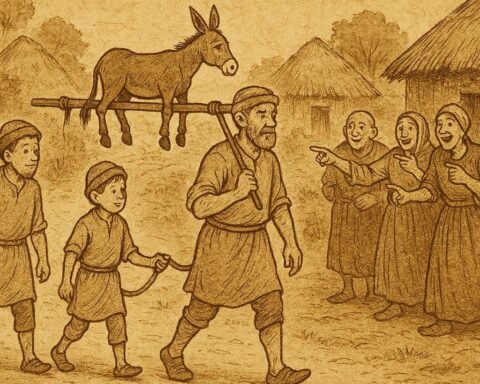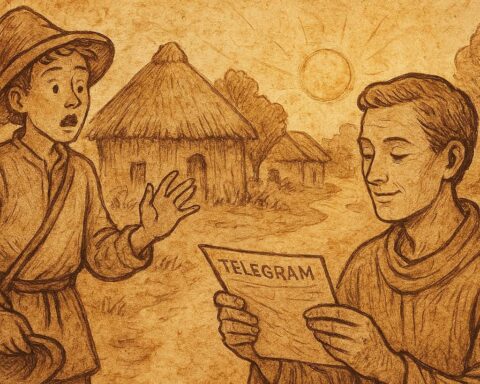Once upon a time, in a humble village of Ghana, there lived a poor man whose life was marked by hardship and simplicity. One quiet afternoon, he sat by the village well, a small, cracked dish of beans resting before him. With slow, deliberate movements, he ate, savoring each morsel as if it were a feast. Suddenly, one bean slipped from his fingers and fell into the dark water of the well with a soft splash.
The man frowned, leaning over to peer into the inky depths. “I must go down and retrieve it,” he muttered to himself, surprising even his own ears. Determined, he tied a rope around his waist and climbed down into the well. But what he expected to be a shallow descent turned into an extraordinary journey.
As he sank deeper, the walls of the well seemed to stretch endlessly. Then, to his astonishment, he stumbled into a city unlike anything he had ever known. The streets were paved with polished stone, shops gleamed with colorful goods, and people bustled about in clothing finer than any he had ever seen. The air smelled of fresh spices and baked bread, and the sunlight filtered through sparkling glass rooftops.
Curious and bewildered, the man wandered into a small grocery shop. As he entered, a customer greeted the shopkeeper with a respectful, “Five prayers upon the Prophet.” The shopkeeper, bowing slightly, handed over a basket of fruit. The poor man watched, wide-eyed. At another store, a man asked for a fine suit, saying, “Twenty prayers upon the Prophet,” and, without hesitation, the shopkeeper presented the suit.
The poor man paused, thought deeply, and whispered to himself, “This is a very great and mysterious place. Here, prayers hold more value than coins. If only I could understand its secrets.” His heart raced with excitement as he continued through the streets. Each shop, each corner, revealed wonders, clothes shimmering with gold threads, jars of honey brighter than sunlight, and trinkets that seemed almost magical. Everywhere, the currency of piety and respect, not money, governed transactions.
He soon encountered a bustling clothing shop. A young woman asked for a robe, saying, “Ten prayers upon the Prophet,” and the shopkeeper immediately handed her a finely woven garment. The poor man realized that in this city, devotion and good intentions were treasured above material wealth.
The more he explored, the more he understood that this hidden world was a reflection of human virtues, patience, respect, and piety. Shops thrived on prayers and blessings, and the people treated one another with generosity and kindness, knowing that sincere words carried immeasurable power. He wandered until the sun began to set, casting long, golden shadows across the cobblestone streets.
At last, he found a quiet fountain in the heart of the city and sat down, reflecting on the marvels he had witnessed. His journey had begun with a single lost bean, yet it had led him to an entire world built on goodwill and reverence. The man smiled softly, understanding that sometimes, what appears to be a trivial loss can open the door to unimaginable discoveries.
When he finally climbed back up the well into his own village, he carried with him more than just the memory of a magical city, he brought hope, wisdom, and the knowledge that even the smallest actions, like a prayer or a kind word, could yield extraordinary rewards.
Moral Lesson
Even the smallest or most humble beginnings, like a single lost bean, can lead to great discoveries. Patience, respect, and piety are invaluable treasures, often more powerful than wealth.
Knowledge Check
Who is the main character in the story?
The poor man who discovers the magical city.
What item leads the poor man into the hidden city?
A single lost bean that falls into the well.
How do the shops in the hidden city operate?
Transactions are based on prayers upon the Prophet, reflecting respect and piety rather than money.
What virtues does the hidden city emphasize?
Patience, generosity, devotion, and respect.
What lesson does the story teach about small beginnings?
Even humble or trivial events can lead to great discoveries and wisdom.
What is the cultural origin of the folktale?
Ashanti folktale from Ghana.
Source: Ghanaian Folktale






